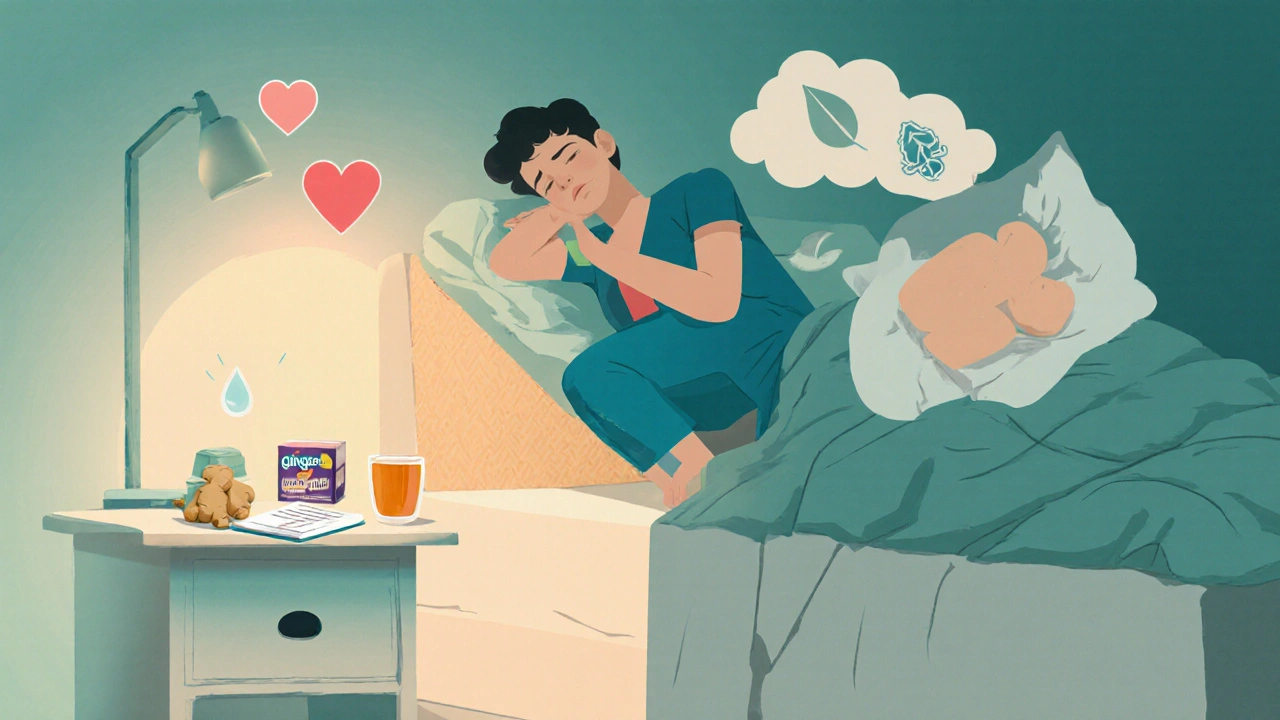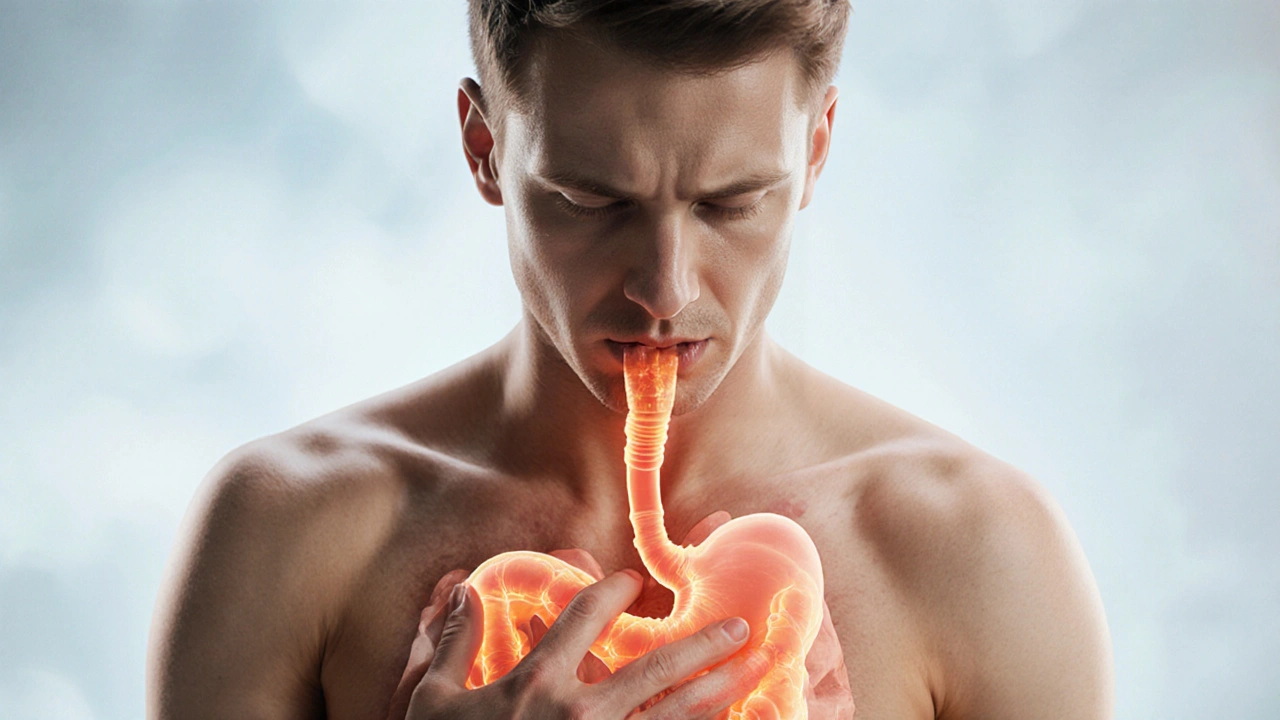Heartburn Trigger & Symptom Identifier
Common Triggers
Understanding what causes heartburn can help prevent uncomfortable episodes.
Recognizing Symptoms
Early recognition of heartburn symptoms helps you respond quickly and effectively.
Identify Your Triggers
Recognize Your Symptoms
Select symptoms you commonly experience:
Your Results
Click "Analyze My Triggers" or "Identify My Symptoms" to see personalized insights.
Key Takeaways
- Heartburn is a burning sensation caused by stomach acid irritating the esophagus.
- Typical triggers include spicy foods, alcohol, caffeine, and lying down after meals.
- Most people find relief with lifestyle changes and over‑the‑counter antacids.
- Persistent or severe symptoms may need prescription‑strength H2 blockers or proton pump inhibitors.
- Complications such as Barrett’s esophagus are rare but require medical monitoring.
Ever felt a sudden burn behind your breastbone after a big dinner? That uncomfortable flare‑up is heartburn a painful, acidic sensation that rises from the stomach into the esophagus. While occasional episodes are common, understanding why they happen and how to stop them can save you from sleepless nights and endless trips to the pharmacy.
What Exactly Is Heartburn?
Gastroesophageal Reflux Disease (GERD) a chronic form of heartburn where acid frequently backs up into the esophagus describes the long‑term version of the same problem. The esophagus the muscular tube that carries food from the mouth to the stomach is lined with delicate tissue that isn’t built to handle the corrosive stomach acid hydrochloric acid that aids digestion and kills bacteria. When the lower esophageal sphincter (LES) a ring of muscle that opens to let food into the stomach and closes to keep acid out weakens or relaxes at the wrong time, acid leaks upward, and you feel that sharp, burning discomfort.
Common Triggers - Why It Happens
Knowing what pushes the LES to open helps you dodge the flare‑ups. The most frequent culprits are:
- Spicy foods - chilies, hot sauce, peppery dishes.
- Fatty or fried meals - they sit longer in the stomach, increasing pressure.
- Alcohol - especially wine and beer, which relax the LES.
- Caffeine - coffee, tea, sodas stimulate acid production.
- Chocolate - a double whammy of fat and caffeine.
- Large meals and eating late at night - gravity works against you when you lie down.
Other factors include smoking, certain medications (like NSAIDs or certain asthma drugs), and anatomical issues like a hiatal hernia when part of the stomach pushes through the diaphragm into the chest. Even stress can amplify symptom perception, making the burn feel worse.

Spotting the Symptoms
The classic sign is a burning sensation that starts behind the breastbone and shoots upward toward the throat. You might also notice:
- A sour or bitter taste in the mouth, especially after lying down.
- Regurgitation of food or liquid.
- Sore throat, hoarseness, or a persistent cough.
- Feeling of a lump in the throat (globus sensation).
- Worsening pain after bending over or exercising.
If you experience chest pain that radiates to the arm or jaw, or shortness of breath, treat it as a potential heart attack and seek emergency care-those symptoms can mimic heartburn but require a different response.
When to Seek Professional Help
Occasional heartburn is usually harmless, but you should talk to a doctor if you notice any of the following:
- Symptoms lasting more than two weeks despite OTC treatment.
- Pain that wakes you up at night or interferes with sleep.
- Unexplained weight loss, vomiting, or difficulty swallowing.
- Frequent regurgitation of a brownish‑black liquid (possible sign of bleeding).
- History of Barrett’s esophagus or other esophageal conditions.
A physician may recommend an endoscopy, pH monitoring, or an esophageal motility test to rule out complications and tailor a treatment plan.
Treatment Options - From Kitchen to Pharmacy
Managing heartburn blends lifestyle tweaks, over‑the‑counter (OTC) remedies, and prescription medications when needed.
1. Lifestyle Adjustments
- Eat smaller, more frequent meals instead of three large plates.
- Stay upright for at least 2-3 hours after eating.
- Elevate the head of your bed by 6‑8 inches.
- Limit or avoid known triggers (spice, alcohol, caffeine).
- Quit smoking - nicotine relaxes the LES.
- Maintain a healthy weight; excess belly fat increases abdominal pressure.
2. Over‑the‑Counter Options
OTC medicines provide fast relief for mild episodes.
| Product Type | How It Works | Typical Onset | Duration of Relief |
|---|---|---|---|
| Antacids (e.g., Tums, Maalox) | Neutralize stomach acid instantly | Minutes | 1-2 hours |
| H2 Blockers (e.g., ranitidine, famotidine) | Reduce acid production by blocking histamine receptors | 30‑60 minutes | 4‑6 hours |
| Proton Pump Inhibitors (PPIs) - OTC (e.g., omeprazole 20mg) | Block the final step of acid secretion | 1‑2 hours | Up to 24 hours |
Antacids are great for immediate, occasional relief. H2 blockers and OTC PPIs work better for daily or night‑time symptoms because they lower overall acid output.
3. Prescription‑Strength Medications
If OTC options don’t keep the burn at bay, a doctor may prescribe stronger H2 blockers (e.g., nizatidine) or higher‑dose PPIs (e.g., esomeprazole 40mg). These are particularly useful for diagnosed GERD, erosive esophagitis, or when complications like Barrett’s esophagus are present.
4. Surgical and Endoscopic Options
In rare, refractory cases, procedures such as laparoscopic Nissen fundoplication (tightening the LES) or endoscopic radiofrequency therapy can provide long‑term control.

Living with Heartburn - Practical Tips
Beyond medication, these everyday habits keep the burn away:
- Chew gum after meals - it increases saliva, which neutralizes acid.
- Wear loose‑fitting clothing to avoid abdominal compression.
- Keep a symptom diary - note foods, timing, and relief methods to spot patterns.
- Use ginger tea or chamomile as a soothing, low‑acid beverage.
For parents, teaching kids to avoid carbonated drinks and to finish meals slowly reduces the likelihood of developing chronic reflux later in life.
Potential Complications
Most people never experience serious issues, but prolonged exposure of acid to the esophageal lining can lead to:
- Barrett’s esophagus a condition where normal esophageal cells change to a type more like intestinal lining, raising the risk of esophageal cancer.
- Esophagitis - inflammation that can cause bleeding or ulcers.
- Strictures - narrowing of the esophagus that makes swallowing difficult.
Regular monitoring and early treatment dramatically cut these risks.
FAQ - Your Burning Questions Answered
Can I treat heartburn with natural remedies alone?
Mild cases often respond to lifestyle tweaks and simple home measures like aloe vera juice, licorice (DGL), or apple cider vinegar diluted in water. However, if symptoms persist for more than a week, adding an OTC antacid or H2 blocker is advisable. Natural options work best as complements, not replacements, for moderate to severe reflux.
Is heartburn the same as acid reflux?
They're closely related. Acid reflux describes the movement of stomach acid upward, while heartburn is the symptom- the burning feeling- that many people notice. All heartburn is reflux‑related, but not every reflux episode causes noticeable heartburn.
How long should I use PPIs?
Short‑term use (4-8 weeks) is typical for healing inflamed esophageal tissue. For chronic GERD, doctors may recommend maintenance at the lowest effective dose, periodically reassessing the need to stay on medication.
Can stress trigger heartburn?
Stress doesn’t directly increase acid, but it can cause you to eat quickly, skip meals, or consume more caffeine and alcohol-all of which are common triggers. Managing stress through mindfulness or gentle exercise often reduces symptom frequency.
Should I avoid all dairy if I have heartburn?
Full‑fat dairy can relax the LES for some people, but low‑fat options are usually safe. The key is to monitor your own response; if a glass of skim milk doesn’t bother you, there’s no need to cut it out completely.
By pinpointing what provokes your episodes, making simple habit changes, and using the right medication when needed, you can keep heartburn from dictating your day. Remember, occasional burns are normal-persistent pain is a signal to act.


Comments
Taryn Bader
Ugh, this heartburn thing is a nightmare.
October 10, 2025 AT 15:33
Myra Aguirre
I get why so many people are scared of that burning feeling. Simple changes like not lying down after meals can actually help a lot. It’s good that the article lists those everyday tips.
October 18, 2025 AT 13:57
Shawn Towner
Honestly, the piece oversimplifies a complex gastro‑esophageal issue. While lifestyle tweaks matter, the underlying pathophysiology isn’t addressed with enough nuance. Most readers will think a dab of antacid is a cure‑all, which is misleading. A deeper dive into sphincter biomechanics would have been welcome.
October 26, 2025 AT 11:21
Ujjwal prakash
Okay, let’s break this down-first, you need to recognize that not all “burns” are created equal; second, the article fails to differentiate between occasional reflux and chronic GERD, which have distinct management pathways; third, the suggested “chew gum after meals” tip, while harmless, is presented as a miracle solution, which is frankly over‑hyped; fourth, the discussion of PPIs neglects the emerging data on long‑term safety concerns, such as micronutrient malabsorption; fifth, you’ll notice the lack of emphasis on weight management, a cornerstone of reflux control; sixth, the tone swings between a lay‑person’s pamphlet and a medical textbook, leaving the reader confused.
November 3, 2025 AT 09:45
Diane Helene Lalande
Great rundown! I especially liked the clear table comparing OTC options-helps pick the right one quickly. Remember to watch for interactions with other meds, like certain antibiotics; a pharmacist can double‑check that. Also, keeping a symptom diary is a solid strategy to spot patterns over time.
November 11, 2025 AT 08:09
Edwin Levita
While your optimism is cute, the reality is that most people ignore the diary and keep popping antacids.
November 19, 2025 AT 06:33
Xander Laframboise
Sure, lifestyle tweaks sound nice, but let’s be real: most sufferers won’t stick to them. The article glosses over the fact that many patients need prescription‑strength therapy from day one. And those “natural remedies” are often just marketing fluff. Bottom line: talk to a doctor early.
November 27, 2025 AT 04:57
Jason Petersen
Data shows adherence rates under 30% for diet changes.
December 5, 2025 AT 03:21
Melissa Gerard
Another article that pretends diet cures everything 🙂.
December 13, 2025 AT 01:45
Cindy Knox
I appreciate the thoroughness, especially the sections on when to seek help. It’s easy to overlook that chest‑pain could be a heart attack, not just reflux. The checklist style makes it less scary to read. Keep the friendly tone, it really helps the anxious reader.
December 21, 2025 AT 00:09
beverly judge
Adding a brief note about the role of stress management could round it out nicely.
December 28, 2025 AT 22:33
Capt Jack Sparrow
First off, the article nails the basics-spicy foods, alcohol, caffeine are classic triggers. Second, the explanation of the LES is spot on; it’s the gatekeeper everyone forgets. Third, over‑the‑counter antacids work fast but only mask symptoms. Fourth, H2 blockers are a step up, but you need to wait for them to kick in. Fifth, PPIs are the heavyweight champs, though you shouldn’t stay on them forever. Sixth, lifestyle tweaks are cheap and effective, yet most ignore them. Seventh, if you’re under 40 and have frequent burns, get checked for hiatal hernia. Eighth, always keep an eye on warning signs like weight loss or vomiting.
January 5, 2026 AT 20:57
Manju priya
Dear readers, let us embark on a journey toward mastering heartburn control with informed enthusiasm.
Understanding the physiological cascade that leads to acid reflux empowers you to intervene proactively.
Begin by maintaining an upright posture for at least three hours after any substantial meal, as gravity assists in keeping gastric contents below the diaphragm.
Select meals that are balanced in macronutrients, avoiding excessive fats that delay gastric emptying.
Incorporate lean proteins and complex carbohydrates to promote steady digestion without overloading the stomach.
Hydration plays a pivotal role; sip water throughout the day but limit large volumes during meals to prevent gastric distension.
Chewing each bite thoroughly, aiming for at least 20–30 chews, initiates salivary enzymes that begin neutralizing acids early.
Consider integrating a brief post‑meal walk of ten to fifteen minutes, which has been shown to reduce reflux episodes.
If you consume caffeine, limit intake to no more than one cup of coffee per day and avoid it after mid‑afternoon.
Alcohol should be reserved for special occasions, and even then, moderate consumption is advisable.
Smoking cessation is non‑negotiable, as nicotine directly relaxes the lower esophageal sphincter, exacerbating reflux.
Should symptoms persist despite these adjustments, an over‑the‑counter H2 blocker taken thirty minutes before dinner can provide supplemental relief.
For chronic cases, consult your healthcare provider about a short course of a proton pump inhibitor, remembering to reassess the need after eight weeks.
Maintain a detailed symptom log, noting foods, timing, posture, and relief measures, to identify personal patterns that may escape casual observation.
By adhering to these evidence‑based strategies, you will significantly diminish the frequency and severity of heartburn, fostering a more comfortable and vibrant lifestyle 😃.
January 13, 2026 AT 19:21
Jesse Groenendaal
People should stop blaming themselves for heartburn it’s not a sin they just eat bad food and ignore doctors
January 21, 2026 AT 17:45
Persephone McNair
From a pathophysiological standpoint the article could integrate the concept of transient LES relaxations as the predominant mechanistic driver rather than just dietary triggers you know the nuance matters
January 29, 2026 AT 16:09